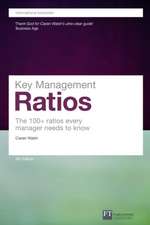Project Selection Under Uncertainty: Dynamically Allocating Resources to Maximize Value: International Series in Operations Research & Management Science, cartea 69
Autor Stylianos Kavadias, Christoph H. Lochen Limba Engleză Paperback – 30 sep 2012
This book takes a step in developing a theory that addresses the need for quantitative prioritization criteria within the broader strategic context of the R&D portfolios. Its foundation lies in mathematical theory of resource-constrained optimization with the goal to maximize quantitative returns. The book seeks to broaden the portfolio discussion in two ways. First, simplified models - appropriate for the data-poor NPD context - are developed, which attempt to illuminate the structure of the choice problem and robust qualitative rules of thumb, rather than detailed algorithmic decision support. Such robust rules can be applied in the R&D environment of poor data availability. Second, the annual portfolio review is not the only important choice in resource allocation. In addition, the book discusses how ideas might be pre-screened as they emerge, and how projects should be prioritized once they are funded and ongoing.
| Toate formatele și edițiile | Preț | Express |
|---|---|---|
| Paperback (1) | 634.00 lei 6-8 săpt. | |
| Springer Us – 30 sep 2012 | 634.00 lei 6-8 săpt. | |
| Hardback (1) | 640.24 lei 6-8 săpt. | |
| Springer Us – 31 ian 2004 | 640.24 lei 6-8 săpt. |
Din seria International Series in Operations Research & Management Science
- 20%
 Preț: 331.25 lei
Preț: 331.25 lei - 9%
 Preț: 696.06 lei
Preț: 696.06 lei - 20%
 Preț: 570.62 lei
Preț: 570.62 lei - 18%
 Preț: 1132.02 lei
Preț: 1132.02 lei - 18%
 Preț: 773.72 lei
Preț: 773.72 lei -
 Preț: 170.40 lei
Preț: 170.40 lei - 17%
 Preț: 459.35 lei
Preț: 459.35 lei - 17%
 Preț: 360.48 lei
Preț: 360.48 lei -
 Preț: 263.40 lei
Preț: 263.40 lei - 24%
 Preț: 905.31 lei
Preț: 905.31 lei - 17%
 Preț: 460.09 lei
Preț: 460.09 lei - 17%
 Preț: 459.35 lei
Preț: 459.35 lei - 20%
 Preț: 631.58 lei
Preț: 631.58 lei - 13%
 Preț: 480.01 lei
Preț: 480.01 lei - 18%
 Preț: 738.28 lei
Preț: 738.28 lei - 18%
 Preț: 1225.94 lei
Preț: 1225.94 lei - 18%
 Preț: 948.92 lei
Preț: 948.92 lei - 18%
 Preț: 703.88 lei
Preț: 703.88 lei - 18%
 Preț: 957.44 lei
Preț: 957.44 lei - 15%
 Preț: 651.84 lei
Preț: 651.84 lei - 20%
 Preț: 336.21 lei
Preț: 336.21 lei - 15%
 Preț: 641.03 lei
Preț: 641.03 lei -
 Preț: 404.29 lei
Preț: 404.29 lei - 18%
 Preț: 950.21 lei
Preț: 950.21 lei - 15%
 Preț: 649.06 lei
Preț: 649.06 lei - 18%
 Preț: 725.75 lei
Preț: 725.75 lei -
 Preț: 394.12 lei
Preț: 394.12 lei - 18%
 Preț: 951.47 lei
Preț: 951.47 lei - 15%
 Preț: 639.59 lei
Preț: 639.59 lei - 18%
 Preț: 773.06 lei
Preț: 773.06 lei - 18%
 Preț: 889.29 lei
Preț: 889.29 lei - 15%
 Preț: 655.60 lei
Preț: 655.60 lei - 15%
 Preț: 640.06 lei
Preț: 640.06 lei
Preț: 634.00 lei
Preț vechi: 745.88 lei
-15% Nou
Puncte Express: 951
Preț estimativ în valută:
121.32€ • 129.73$ • 101.15£
121.32€ • 129.73$ • 101.15£
Carte tipărită la comandă
Livrare economică 17 aprilie-01 mai
Preluare comenzi: 021 569.72.76
Specificații
ISBN-13: 9781461347859
ISBN-10: 1461347858
Pagini: 164
Ilustrații: XI, 145 p.
Dimensiuni: 155 x 235 x 9 mm
Greutate: 0.24 kg
Ediția:Softcover reprint of the original 1st ed. 2004
Editura: Springer Us
Colecția Springer
Seria International Series in Operations Research & Management Science
Locul publicării:New York, NY, United States
ISBN-10: 1461347858
Pagini: 164
Ilustrații: XI, 145 p.
Dimensiuni: 155 x 235 x 9 mm
Greutate: 0.24 kg
Ediția:Softcover reprint of the original 1st ed. 2004
Editura: Springer Us
Colecția Springer
Seria International Series in Operations Research & Management Science
Locul publicării:New York, NY, United States
Public țintă
ResearchCuprins
1. Introduction to the Portfolio Selection Problem.- 1 Introduction.- 2 Portfolio Selection: A Complex Task.- 3 Research Questions and Overview of this Book.- 2. What Has Been Done So Far?.- 1 Introduction.- 2 Operational Decisions.- 3 Strategie Decisions.- 4 Strategie Alignment of R&D: an Example.- 5 Implications for this Book.- 3. Dynamic Selection of NPD Programs.- 1 Introduction.- 2 Model Setup.- 3 Increasing Returns.- 4 Decreasing Returns.- 5 Decreasing Returns and Market Interactions.- 6 Decreasing Returns and Risk Aversion.- 7 Numerieal Example.- 8 n Product Lines and T Periods.- 9 Discussion and Conclusion.- 4. Applying Project Selection at Gemstone.- 1 Introduction.- 2 The Diamond Producer GemStone Inc..- 3 Selecting the Portfolio at GemStone.- 4 Discussion and Conclusion.- Admitting Projects One-By-One.- 1 Introduction.- 2 Model Setup.- 3 Optimal policy.- 4 Discussion and Conclusion.- Prioritizing Ongoing Projects.- 1 Introduction.- 2 Model and Optimal Sequencing Policy.- 3 Discussion and Examples.- 4 Conclusion.- What Have We Learned?.- References.- About the Authors.
Recenzii
From the reviews:
"This book is rooted in the mathematical theory of resource constrained optimization with the goal of maximization quantitative turns … . It attempts to broaden the portfolio discussion in two ways. First, simplified models appropriate for a new product development context are described where the lack of precise data is typical. Second, not only the annual portfolio review is discussed, but also what should be done with ideas as they emerge, and how projects should be prioritized once they are funded and ongoing." (Klaus Ehemann, Zentralblatt MATH, Vol. 1056 (7), 2005)
"This book is rooted in the mathematical theory of resource constrained optimization with the goal of maximization quantitative turns … . It attempts to broaden the portfolio discussion in two ways. First, simplified models appropriate for a new product development context are described where the lack of precise data is typical. Second, not only the annual portfolio review is discussed, but also what should be done with ideas as they emerge, and how projects should be prioritized once they are funded and ongoing." (Klaus Ehemann, Zentralblatt MATH, Vol. 1056 (7), 2005)








